While forming farmers’ collectives to promote the most relevant technologies and to engage in collective marketing are important, farmers do need immediate support for marketing their produce during pandemics and disasters. Providing such support is critical to ensure sustainability of such initiatives, and is also a moral responsibility for change agents, argues Mukund Patil, Sreenath Dixit, Satish Gahukar and Arun Seshadri.
CONTEXT
Maharashtra State in India, has been reeling under the impact of the COVID-19 pandemic for the last two months. The economy of the State, known for its agrarian workforce and bustling markets, has come to a virtual standstill ever since the national lockdown was imposed from 24 March 2020. With a large-scale economic setback looming large, the State’s agriculture and allied sectors have also taken a beating. The Government of India has been working extremely hard to ease the suffering faced by farmers and have granted exemption to movement of farm produce during the lockdown. Many other organizations across India have also pitched in. In this blog, we focus on how the International Crops Research Institute for the Semi-Arid Tropics (ICRISAT) and JSW Foundation have been helping chili farmers cope with marketing of their produce in view of COVID-19.
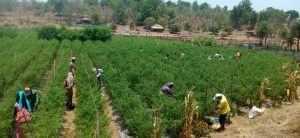 Green chili harvesting at farmers’ fields
Green chili harvesting at farmers’ fields
PARTNERING FOR A CAUSE
From 2015 onwards, JSW Foundation and ICRISAT, along with rural communities, have been working with the Government of Maharashtra to reduce malnutrition in Jawhar taluk of Palghar district. The farming community from six project villages (Ghivanda, Kogdha, Jamsar, Dabheri, Sakharshet, and Chambharshet), came together to develop a site of learning for demonstrating livelihood improvement through the integrated watershed management approach with the specific goal of increasing agricultural productivity and improving rural livelihoods. The key project interventions include rainwater harvesting, soil conservation, and crop productivity enhancement, with active participation from the community.
The journey started with the formation of the village level watershed committee: ‘Pragati Bahu-Uddeshiya Sevabhavi Sansthan’, comprising of members from all six selected villages. The watershed committee is an important stakeholder for planning and implementing watershed interventions. The farmers from the six villages and the watershed committee with guidance from ICRISAT and JSW Foundation came together to address the key challenges of water scarcity and land degradation by implementing soil and water conservation measures for rainwater harvesting and reducing soil erosion, and creating water storage capacity of about 65000 m3. The farming community also actively participated in the demonstration of good agricultural practices, and witnessed improvement in crop productivity by 30 to 50% as compared to traditional cultivation practices.
DEALING WITH THE LOCKDOWN CHALLENGES
In 2019, chili cultivation started with 46 farmers – covering 50 acres – with an expected production of 350 tons of green chili. The harvest season started as per plan in February 2020 and Del Monte (a multinational agribusiness company involved in fresh and processed fruits and vegetables) initiated the buying process for the export market. During March 2020, central and state governments imposed strict restrictions as precautionary measures to control the spread of COVID-19, which would have a direct impact on the movement of harvested chili. Moreover, Del Monte also stopped purchasing the chili, during the early days of the lockdown, as export operations were restricted. The entire nation has been under lockdown since the last week of March 2020, but fortunately, the markets for agriculture commodities were allowed to function with strict guidelines to maintain social distancing and hygiene at market yards.
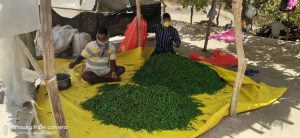 Farmers engaged in grading and packing the green chilies
Farmers engaged in grading and packing the green chilies
Dealing with the logistics
A series of logistical issues awaited the staff. The following measures ensured that the chilis were sold before any losses could be incurred by the farmers. The project team had two possible options: first contact the traders in the APMC market for selling the chilies; and second let the chili mature on the plant and opt for dry red chili. While the ready-to-harvest green chili stayed on the plants in the fields, the project team contacted several traders in the market yards at Navi Mumbai and Nashik for the possible sale of chili. Fortunately, a trader from Navi Mumbai market yard agreed to buy the chili at the market rate, but he wanted the chili to be brought to the market yard.
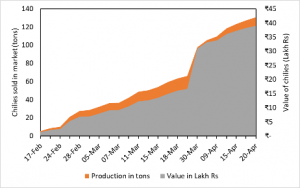 Figure 1: Production and value of green chilies from 46 farmers
Figure 1: Production and value of green chilies from 46 farmers
The project team then contacted the Tahsildar and Taluk Agriculture Officer for their support to allow the movement of vehicles carrying the chili from Jawhar to Navi Mumbai. Once permission was granted, the entire project team worked on a war footing to coordinate the chili harvesting and subsequent delivery of harvested chili to the collection points. The coordination activity included the following:
- About five tons of chili were collected and dispatched to the Navi Mumbai market in the first attempt on the evening of 29 March 2020. The project team members accompanied the vehicles to the market. Since it was the initial period of lockdown, there was a lot of confusion and rumors about the operations in the market yard as the state government also announced the shutting down of a part of the market yard, and shifting the vegetable market yard to a different place.
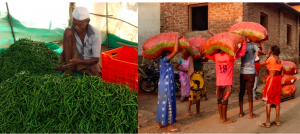 Family members engaged in grading, packing, and dispatching the green chilies to market
Family members engaged in grading, packing, and dispatching the green chilies to market
- About five tons of chili were collected and dispatched to the Navi Mumbai market in the first attempt on the evening of 29 March 2020. The project team members accompanied the vehicles to the market. Since it was the initial period of lockdown, there was a lot of confusion and rumors about the operations in the market yard as the state government also announced the shutting down of a part of the market yard, and shifting the vegetable market yard to a different place.
- In-between all the chaos, vehicles reached Navi Mumbai during the wee hours of the morning to find a long line of vehicles struggling for entry into the market yard.
- Each vehicle was allowed to enter into the market yard after sanitization and with proper documents from the trader. Finally, the trader arranged to unload the chili into a cold storage unit outside the market yard with a commitment to make payment as per the market rate. After this transaction, the same trader has shown interest in buying the chili, but this time the trader sent a vehicle from Navi Mumbai. Up to 20 April, a total of 130 tons of green chili worth Rs 39 lakhs were sold through either Del Monte, Navi Mumbai market yard, or local market (Figure 1).
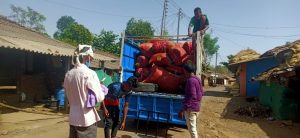 Loading green chilis to market
Loading green chilis to market
- The restrictions imposed during the lockdown has certainly reduced the quantity of green chili sold, but with the kind cooperation of district administration, traders, and Del Monte, the project team could sell the green chili at market rate.
- So far 50% of the anticipated production has been sold as green chilis, and market linkages again closed after 20 April.
- The project team is trying to establish new linkages, as another sale of 100-150 tons is required to cross the break-even point and earn a profit. As a last resort, the remaining/upcoming chili produce will be dried and stored for the red chili market.
LESSONS
Implementation of this initiative as a collaborative effort, over the last three years, gave us five lessons on dealing with issues related to productivity, marketing and raising farm income, including dealing with uncertainties in marketing during COVID-19. These are discussed below.
Importance of farmer collectives
The key drawbacks for improving the income of farmers from this area were small land holdings, traditional cultivation practices, and limited access to the faraway market places. Farmers, although not all, being aware of these limitations, attempted collective marketing of jasmine flowers. Collective or group farming provides a scale to produce a good quality crop and also to negotiate with the market while optimizing available resources, and reducing the cost of production.
Technology demonstrations
The integrated watershed management approach, while addressing the issues related to water security and soil erosion, also facilitated the introduction of improved agricultural practices. The project team piloted the activities toward improving profitability through collective farming of vegetables. The project team, along with Del Monte, supported the farmers on field preparation, installation of drip irrigation, fertilizers, pesticides, and technical know-how, which has ensured adoption of good agricultural practices.
Establishing buyback agreements
Realizing the benefits of collective farming during the pilot phase, the activity was further strengthened through a formal operational and marketing support agreement with Del Monte for green chili cultivation. A buyback agreement was done with 30 farmers for the cultivation of green chili on 25 acres. During 2018-19 around 75 tons of chili were produced, of which 39 tons were purchased by Del Monte, and the remaining production was sold in the local market. The additional income through this initiative was about Rs. 85,640 for each farmer. With this success, more farmers joined the collective farming venture and area under this activity increased to 50 acres in 2019-20.
Producing to meet market standards
The key elements of collective farming at Jawhar were to produce high-quality chili as per market requirements, which was ensured while planning and implementing all the operations – right from selection of chili variety to grading of the harvested chili. The chili variety was specially selected for export purpose, and use of agrochemicals including nutrients and pesticides were done as per guidelines set by the export market.
Organizing emergency support during crisis
While farmers follow our advice and invest more time and resources in growing crops, it is our moral responsibility to support them while they face a crisis. This is critical to gain their confidence, and to ensure sustainable improvements in their livelihoods. Extension and Advisory Services (EAS) have to go the extra mile and engage in crisis management activities to protect their livelihoods, and the project team supported farmers in marketing their produce which wouldn’t have been possible for them if left unsupported.
FINAL WORDS
While forming farmers’ collectives to promote most relevant technologies and engage in collective marketing are important, farmers do need immediate support for marketing their produce during pandemics and disasters. Providing such support is critical to ensure sustainability of such initiatives. But more importantly, it is a moral responsibility for Extension and Advisory Services.
 Dr Mukund Patil, Senior Scientist, ICRISAT Development Center (IDC), International Crops Research Institute for the Semi-Arid Tropics (ICRISAT). m.patil@cgiar.org
Dr Mukund Patil, Senior Scientist, ICRISAT Development Center (IDC), International Crops Research Institute for the Semi-Arid Tropics (ICRISAT). m.patil@cgiar.org

Dr Sreenath Dixit, Principal Scientist & Theme leader, IDC. D.Sreenath@cgiar.org
 Mr Satish Gahukar, Research Technician, IDC. satishgahukar@yahoo.co.in
Mr Satish Gahukar, Research Technician, IDC. satishgahukar@yahoo.co.in

Mr Arun Seshadri-Scientific Officer, IDC. A.Seshadri@cgiar.org



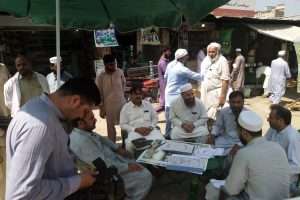

I do appreciate the efforts taken by the said project team in helping farmers of a cluster to market Chillies during the lockdown. I consider this as a perfect facliitation role in extension. It becomes evident that “facilitation and extension advisory services” are fully different. Very recently, Dr. Rasheed sir has started working on identification of ” facilitation role in the mainstream extension system”. Tangible results are always obtainable while performing the role of facilitation rather on mere extension advisory services. Many extension organisations have to reverse roles from “advisory services to facilitation” during climate extremes, pandemic lockdowns and others. No doubt, passion matters for facilitation and this blog reflects that. The influential point in this field note is “ Once permission was granted, the entire project team worked on a war footing to coordinate the chili harvesting and subsequent delivery of harvested chili to the collection points”. I personally congratulate the writers of this field note and the passion they had to perform this activity.
Blogs of this kind may give more insights to the FPOs to plan for contingent measures in view of any probable uncertanities in the agricultural sector.